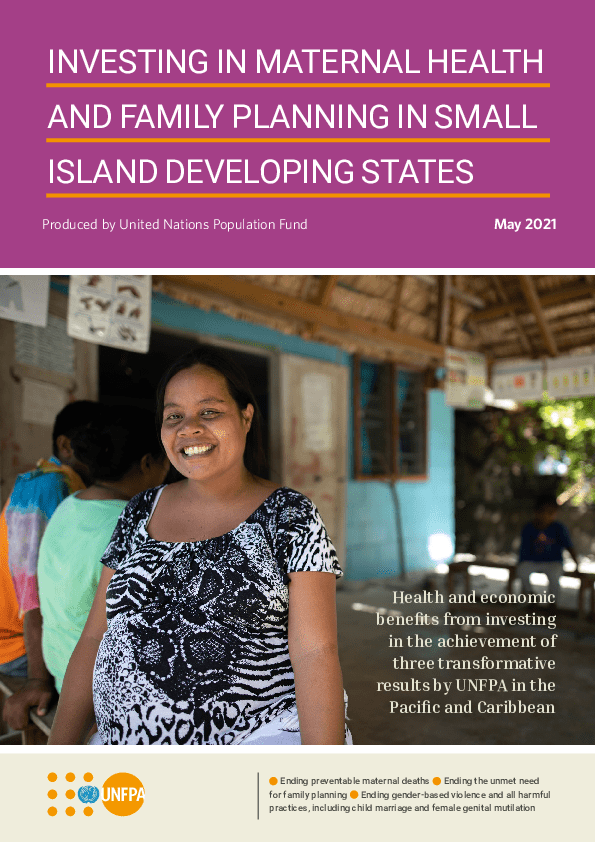
Publication
Investing in Maternal Health and Family Planning in Small Island Developing States
Number of pages: 68
Publication date: 01 May 2021
Author: UNFPA

Publication
Number of pages: 68
Publication date: 01 May 2021
Author: UNFPA
This investment case presents evidence for governments on how to prioritize health system interventions amid the disruptions of the COVID-19 pandemic and in the years to follow, focusing on countries in the Pacific and the Caribbean. The evidence emphasizes scaling up maternal health interventions to reach national targets and reduce maternal mortality, as well as empowering women by reducing high levels of unmet need for family planning through increased investment in high-quality, rights-based contraceptive services. The evidence accounts for the disruptions and long-term impact of the COVID-19 pandemic, and favors simultaneously scaling up interventions with a focus on efficiency and cost-savings rather than a more comprehensive, less focused, approach. The estimated values herein illustrate that reaching coverage targets in the Pacific and the Caribbean is not only possible, but affordable, through the prioritization of family planning and maternal health services.
This investment case considers the potential impact, investment requirements and return on investment for scenarios to meet coverage targets by 2030. These targets are: achieving 95 per cent coverage by maternal health services and realizing 0 per cent unmet need for family planning, compared with the business-as-usual scenario of maintaining existing coverage, which reflects reductions in 2020 and 2021 due to disruptions from the pandemic. Findings indicate that if an additional $13.4 million is invested between 2020 and 2030 in Kiribati, Samoa, Solomon Islands, Tonga and Vanuatu, then the 2030 family planning and maternal health coverage targets could be achieved. This additional investment could avert 38 per cent more unintended pregnancies than business as usual (17 per cent of all pregnancies), 28 per cent more stillbirths and 29 per cent more maternal deaths, and could bring an estimated elevenfold economic benefit of $149.7 million. Furthermore, if an additional $18.8 million is invested between 2020 and 2030 in Barbados, Guyana, Jamaica and Saint Lucia, then the 2030 family planning and maternal health coverage targets could be achieved. This additional investment could avert 23 per cent more unintended pregnancies than business as usual (10 per cent of all pregnancies), 23 per cent more stillbirths and 25 per cent more maternal deaths, and could bring an estimated twentyfold economic benefit of $375.4 million.